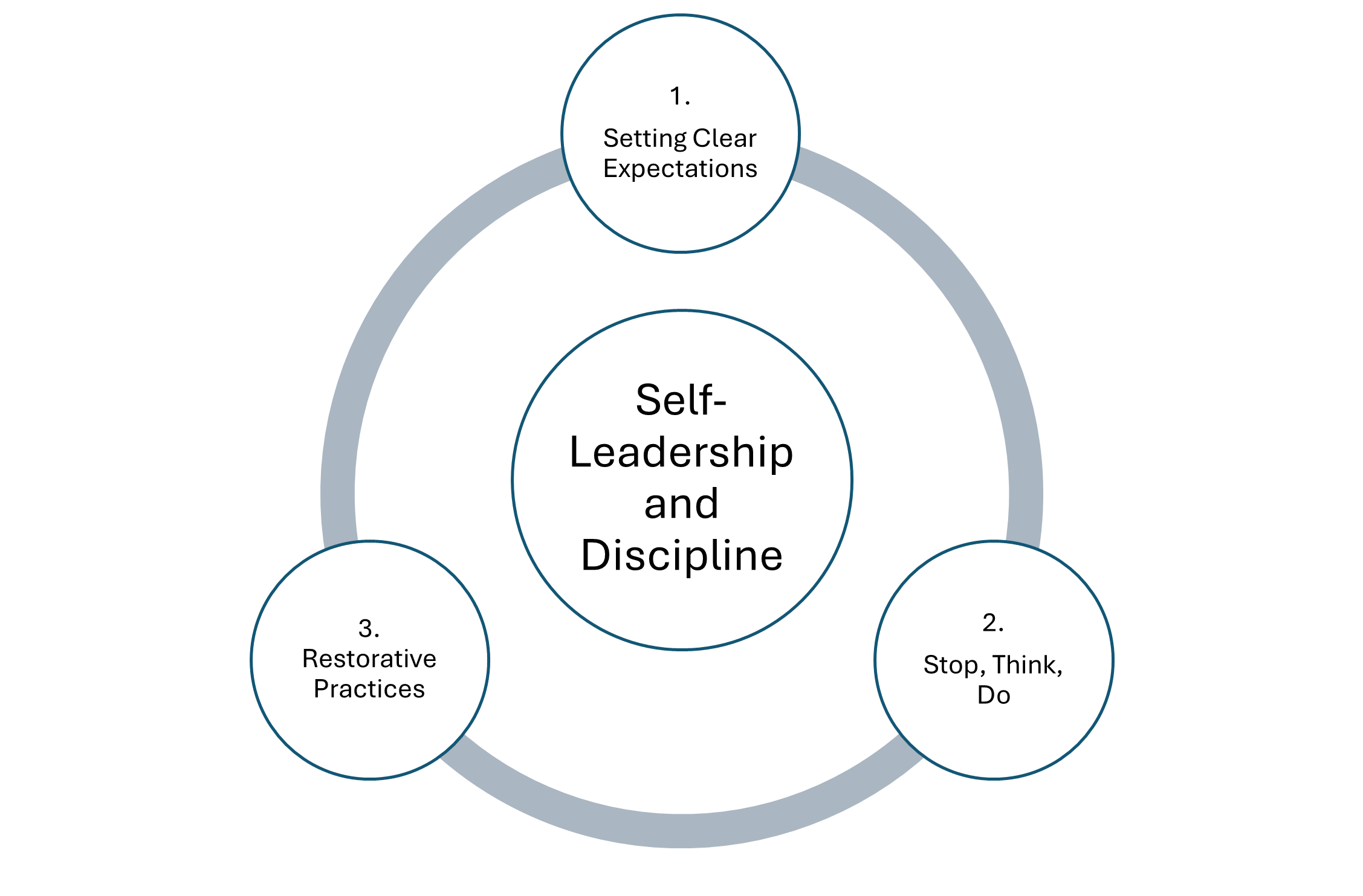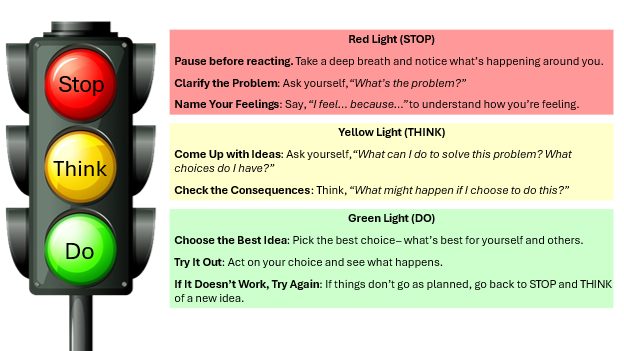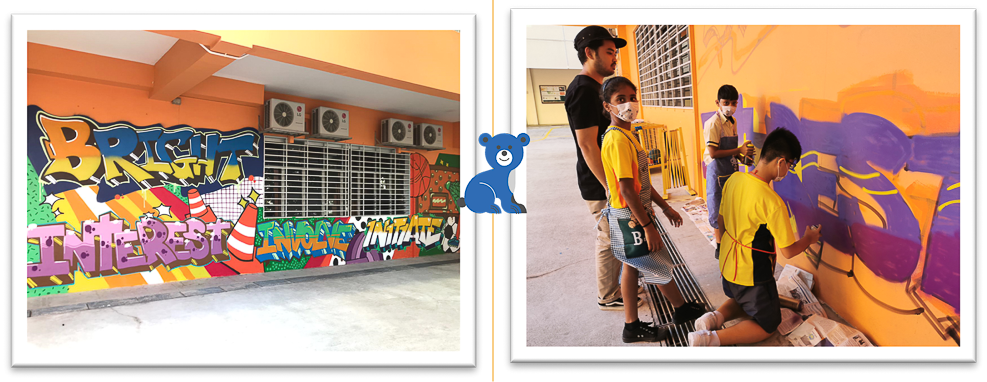Student Management
Curriculum Goals / Overview:
Together with Student Leadership Development, Student Management (Discipline) resides in the Pupil Development (PD) Department which aims to maintain the positive school tone that encourages students to develop and exercise self-discipline and leadership. This supports the school’s continuous efforts to strengthen positive school culture and enhance pro-social relationships amongst students, teachers and parents.
LAKESIDE PRIMARY SCHOOL APPROACH TOWARDS DISCIPLINE

At Lakeside Primary School, our discipline framework focuses on cultivating self-leadership, accountability, and respect in all students. Rooted in Restorative Practices (RP), our approach emphasizes empathy, relationship-building, and sustainable behavioral change over punitive measures. By addressing inappropriate behavior promptly and constructively, we ensure students develop the self-discipline and character necessary for lifelong success.
Key Components of Our Discipline Framework:
1. Setting Clear Expectations
We establish a safe, respectful, and conducive learning environment by clearly communicating behavioral expectations. This proactive approach fosters consistency and reinforces positive behavior across the school community.
2. Stop, Think, Do – Traffic Light Method
Using the “Stop, Think, Do” method, students are guided to pause, reflect on their actions, and make responsible decisions. This process aligns with our school’s LPRIDE values, encouraging self-regulation and thoughtful decision-making.

3. Restorative Practices
ACES
 • Leading Self is taking ownership of our attitudes and contributing to the BRight school culture.
• Leading Self is taking ownership of our attitudes and contributing to the BRight school culture.
2. Intervention
When misconduct occurs, we apply restorative interventions to ensure fairness and dignity. Key strategies include:
• Facilitating circle time to address issues constructively
• Encouraging students to acknowledge mistakes, take responsibility, and repair harm
• Supporting reintegration through relationship healing and community support
3. Restoration
Even when consequences are necessary, they are implemented with a restorative focus. Examples include:
• Behaviour Contracts and Reflection Time (RT) to encourage personal growth
• Traditional consequences such as detention, suspension are used in conjunction with restorative efforts
*Bullying involves hurting or intimidating others repeatedly to deliberately cause harm, distress or humiliation. It can be physical verbal or relational/social in nature.
Disciplinary Consequences (categorised by severity and frequency)
Guiding Principles
All consequences are guided by the following principles:
• Fairness and Consistency: Ensuring all students are treated equitably.
• Restoration over Punishment: Prioritizing repair of harm and personal growth.
• Empathy and Accountability: Helping students understand the impact of their actions on others.
• Holistic Support: Addressing both behavior and the student’s well-being.
1. Low-Severity or First-Time Offences
Focus: Correction, Reflection, and Early Intervention
Examples: Minor disruptions, incomplete homework, low-level disrespect
Consequences:
• Verbal/Stern Warnings
• Warning Letter
• Recess Play Restrictions
• Supervised Recess
• Classroom Intervention (teacher-led corrective actions)
• Reflection Time (Circle Time)
2. Moderate-Severity or Repeated Offences
Focus: Accountability, Behavior Adjustment, and Restorative Dialogue
Examples: Repeated defiance, inappropriate language, or minor vandalism
Consequences:
• Counselling
• Conferencing with Teachers, Parents, and/or School Leaders
• Behavior Contract
• Probation or Removal from Leadership Position
• Cleaning School Property or Paying for Damages (upon proof of offence)
• Drop in Conduct Grade
• Record in the School Offence Module (SOM)
3. High-Severity or Persistent Offences
Focus: Serious Accountability, Repairing Harm, and Behavioral Rehabilitation
Examples: Bullying, fighting, theft, or severe disrespect
Consequences:
• Suspension (In-School, CCA, or Home)
• Referral to External Agencies (for additional support or intervention)
• Formal Counselling and Support Plans
4. Severe or Repeated Serious Offences
Focus: Ensuring Safety, Reintegration, and Restorative Justice
Examples: Physical violence, severe vandalism, or repeated high-severity misconduct
Consequences:
• Caning (for boys, in accordance with school policy)
• External Agency Referral (e.g., social services or professional counselors)
• Restorative Justice Conference (involving all affected parties)

3. Restorative Practices
Restorative Practices form the heart of our discipline approach, focusing on accountability, repairing harm, and strengthening relationships. Through restorative circles, students explore the impact of their actions on others and work towards meaningful resolutions.
Pillars of our Discipline Strategy
1. PreventionWe promote a positive school climate through proactive initiatives, such as ACES, Social Skills Workshops and Cyber-Wellness activities, that reinforce core values, enhance well-being, and reduce the likelihood of negative behaviors.
ACES
The After Curriculum Engagement and Support (ACES) programme caters to identified P4-6 students. It has evolved to provide life-skills coaching and mentoring for its members. Enrichment activities were infused into the ACES experience to strengthen relationships with adults and promote a positive peer culture. The design of ACES aligns to the school’s 3-INs framework: INTEREST-INVOLVE-INITIATE, i.e. to bring about positive experiences, purposeful engagement and motivation in the students.
ACES allows students drop in at the BRight Room after school to engage in meaningful peer bonding, positive social interaction and learning through recreational activities. Here, students can develop a sense of belonging and being valued; where they share the challenges they are facing while supporting one another.
ACES allows students drop in at the BRight Room after school to engage in meaningful peer bonding, positive social interaction and learning through recreational activities. Here, students can develop a sense of belonging and being valued; where they share the challenges they are facing while supporting one another.
 • Leading Self is taking ownership of our attitudes and contributing to the BRight school culture.
• Leading Self is taking ownership of our attitudes and contributing to the BRight school culture.
2. Intervention
When misconduct occurs, we apply restorative interventions to ensure fairness and dignity. Key strategies include:
• Facilitating circle time to address issues constructively
• Encouraging students to acknowledge mistakes, take responsibility, and repair harm
• Supporting reintegration through relationship healing and community support
3. Restoration
Even when consequences are necessary, they are implemented with a restorative focus. Examples include:
• Behaviour Contracts and Reflection Time (RT) to encourage personal growth
• Traditional consequences such as detention, suspension are used in conjunction with restorative efforts
Lakeside Primary School’s discipline approach ensures that every student is supported in developing empathy, accountability, and resilience. By combining clear expectations, thoughtful interventions, and restorative practices, we nurture responsible, self-disciplined individuals ready to lead with integrity.
Lakeside Primary School Offenses and Consequences Framework
| Minor Offences | Major Offences |
| • Late coming (late for school with no valid reason) • Failure to complete assignment • Littering • Improper attire/grooming (disobeying school rules on attire, hairdo, jewellery, etc) |
• Skipping lessons/Leaving school grounds without permission during school hours • Truancy (being absent from school without a valid reason during school days (Mon-Fri) • Forgery (forging signatures, medical certificates, consent forms, etc) • Cheating in assessments/tests/ examinations • Disruptive behaviour • Open defiance and/or rudeness (refusing to conform to school rules, norms and practices; disobeying teacher’s instructions; displaying rudeness and disrespect in speech and body language; using/verbalising vulgar, coarse or abusive language • Hurtful behaviour/ *bullying • Theft (stealing school property or property belonging to others) • Vandalism (vandalising school or personal property, writing graffiti) • Assault (attacking others violently, whether causing hurt or not) • Fighting • Possession of weapon(s) and sharp objects |
Disciplinary Consequences (categorised by severity and frequency)
To ensure fair and consistent discipline, consequences at Lakeside Primary School are categorized based on the severity or frequency of the offence. Each consequence is designed to be restorative, aiming to promote accountability, repair harm, and support personal growth.
Guiding Principles
All consequences are guided by the following principles:
• Fairness and Consistency: Ensuring all students are treated equitably.
• Restoration over Punishment: Prioritizing repair of harm and personal growth.
• Empathy and Accountability: Helping students understand the impact of their actions on others.
• Holistic Support: Addressing both behavior and the student’s well-being.
1. Low-Severity or First-Time Offences
Focus: Correction, Reflection, and Early Intervention
Examples: Minor disruptions, incomplete homework, low-level disrespect
Consequences:
• Verbal/Stern Warnings
• Warning Letter
• Recess Play Restrictions
• Supervised Recess
• Classroom Intervention (teacher-led corrective actions)
• Reflection Time (Circle Time)
2. Moderate-Severity or Repeated Offences
Focus: Accountability, Behavior Adjustment, and Restorative Dialogue
Examples: Repeated defiance, inappropriate language, or minor vandalism
Consequences:
• Counselling
• Conferencing with Teachers, Parents, and/or School Leaders
• Behavior Contract
• Probation or Removal from Leadership Position
• Cleaning School Property or Paying for Damages (upon proof of offence)
• Drop in Conduct Grade
• Record in the School Offence Module (SOM)
3. High-Severity or Persistent Offences
Focus: Serious Accountability, Repairing Harm, and Behavioral Rehabilitation
Examples: Bullying, fighting, theft, or severe disrespect
Consequences:
• Suspension (In-School, CCA, or Home)
• Referral to External Agencies (for additional support or intervention)
• Formal Counselling and Support Plans
4. Severe or Repeated Serious Offences
Focus: Ensuring Safety, Reintegration, and Restorative Justice
Examples: Physical violence, severe vandalism, or repeated high-severity misconduct
Consequences:
• Caning (for boys, in accordance with school policy)
• External Agency Referral (e.g., social services or professional counselors)
• Restorative Justice Conference (involving all affected parties)

